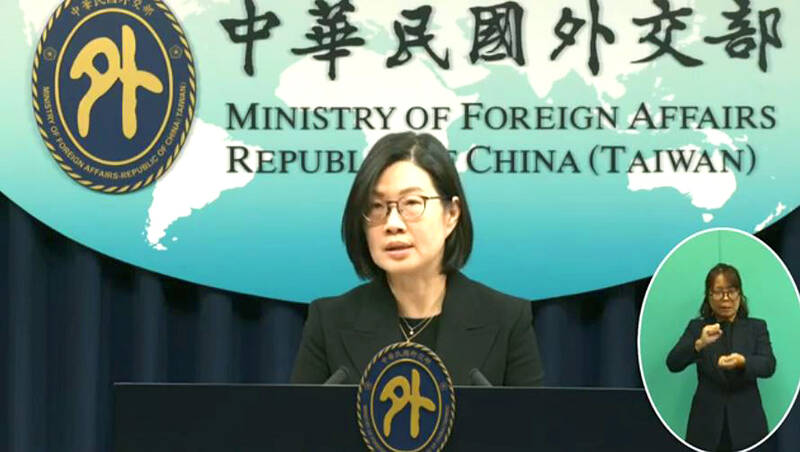US Secretary of State Marco Rubio has reiterated that the US government’s long-standing security commitment to Taiwan is based on the Taiwan Relations Act and the “six assurances,” the Ministry of Foreign Affairs said yesterday following concerns over Washington’s policy shift toward Ukraine and its possible implications for Taiwan.
The ministry’s North American Affairs Department Director-General Wang Liang-yu (王良玉) made the remark in response to media queries at the ministry’s weekly news conference.
“The US government, from administration to administration, has consistently reiterated its security commitment to Taiwan based on the Taiwan Relation Act and the six assurances,” Wang said.

Photo: Screen grab from a Ministry of Foreign Affairs livestream
The US’ long-standing position toward Taiwan has also been reiterated by Rubio, she added.
Rubio, in an interview on Thursday last week, reaffirmed Washington’s opposition to any forced change to the “status quo” across the Taiwan Strait and said that the US remains committed to its long-standing policies on Taiwan.
Since US President Donald Trump took office, his administration has — through the joint statements of a US-Japan meeting and a US-Japan-South Korea foreign ministers’ meeting — emphasized “the importance of maintaining peace and stability across the Taiwan Strait as an indispensable element of security and prosperity for the international community,” Wang said.
They have also expressed “opposition to any attempts to unilaterally force or coerce changes to the status quo,” as well as their “support for Taiwan’s meaningful participation in international organizations,” she said.
The ministry and government agencies would continue to promote Taiwan-US relations and demonstrate Taiwan’s self-defense determination, as well as strengthen the nation’s self-defense capability to achieve the goal of “peace through strength,” she said.

Several Chinese Nationalist Party (KMT) officials including Chairman Eric Chu (朱立倫) are to be summoned for questioning and then transferred to prosecutors for holding an illegal assembly in Taipei last night, the Taipei Police said today. Chu and two others hosted an illegal assembly and are to be requested to explain their actions, the Taipei City Police Department's Zhongzheng (中正) First Precinct said, referring to a protest held after Huang Lu Chin-ju (黃呂錦茹), KMT Taipei's chapter director, and several other KMT staffers were questioned for alleged signature forgery in recall petitions against Democratic Progressive Party (DPP) legislators. Taipei prosecutors had filed

Taiwan would welcome the return of Honduras as a diplomatic ally if its next president decides to make such a move, Minister of Foreign Affairs Lin Chia-lung (林佳龍) said yesterday. “Of course, we would welcome Honduras if they want to restore diplomatic ties with Taiwan after their elections,” Lin said at a meeting of the legislature’s Foreign Affairs and National Defense Committee, when asked to comment on statements made by two of the three Honduran presidential candidates during the presidential campaign in the Central American country. Taiwan is paying close attention to the region as a whole in the wake of a

President William Lai (賴清德) has appointed former vice president Chen Chien-jen (陳建仁) to attend the late Pope Francis’ funeral at the Vatican City on Saturday on his behalf, the Ministry of Foreign Affairs said today. The Holy See announced Francis’ funeral would take place on Saturday at 10am in St Peter’s Square. The ministry expressed condolences over Francis’ passing and said that Chen would represent Taiwan at the funeral and offer condolences in person. Taiwan and the Vatican have a long-standing and close diplomatic relationship, the ministry said. Both sides agreed to have Chen represent Taiwan at the funeral, given his Catholic identity and

NEW WORLD: Taiwan is pursuing innovative approaches to international relations through economics, trade and values-based diplomacy, the foreign minister said Taiwan would implement a “three-chain strategy” that promotes democratic values in response to US tariffs, Minister of Foreign Affairs Lin Chia-lung (林佳龍) said. Taiwan would aim to create a “global democratic value chain,” seek to capitalize on its position within the first island chain and promote a “non-red supply chain,” Lin was quoted as saying in the ministry’s written report to the Legislative Yuan submitted ahead of the legislature’s Foreign Affairs and National Defense Committee meeting slated for today. The Ministry would also uphold a spirit of mutual beneficial collaboration, maintaining close communication and consultations with Washington to show that Taiwan-US cooperation